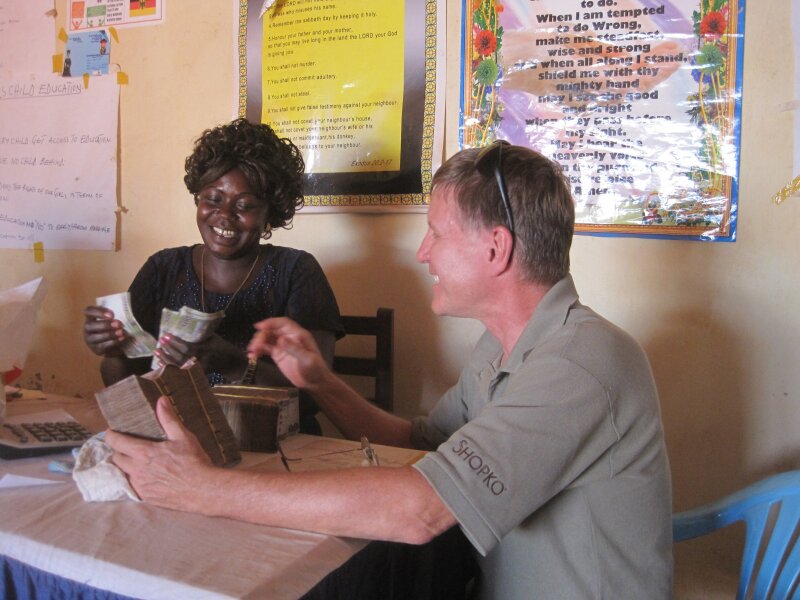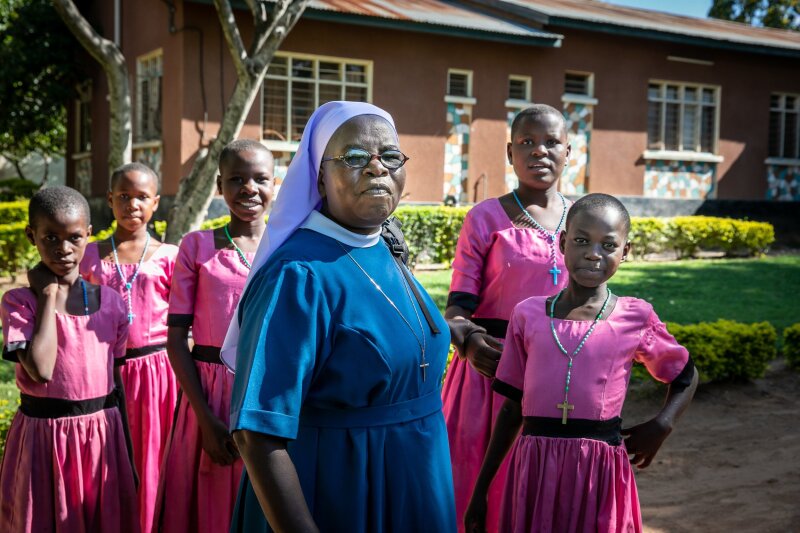
GRASS ROOTS EFFORTS MAKE A DIFFERENCE IN AFRICA
Catholic News Service
04/19/2021
Emelia Yabang: Recognizing the power of working in groups
Gabe Hurrish/Catholic News Service
Throughout most of the world, women live life at a disadvantage. It's even tougher in Africa, and many women in South Sudan experience severe oppression. Several men here have told me that "a cow is more valuable than a woman."

Emelia Yabang counts money with Gabe Hurrish at the
Anika store in Yambio, South Sudan. CNS photo/
courtesy Gabe Hurrish via Maryknoll Lay Missioners
Most girls are not allowed to finish school; many are married off at the age of 13 or 14 to old men — being sold for cows or cash as their dowry. All too often their life is drudgery and abuse. During armed conflict, they are sometimes raped by combatants or used as slaves and concubines.
Many have been abandoned by men or are widows struggling to raise their children. Emelia Yabang, whom I met two years ago in Yambio, is helping women facing these challenges.
Emelia impressed me with her cheerfulness and big smile when she came to our teachers' college to sell trinkets such as dish soap, hand lotion, peanuts and baskets. I later found out she is the director of Anika ("We can do it" in the local Pazande language), a women's group she started with no outside funding or assistance. The group helps women create small businesses, making and selling clothes and many other products.
The women also pray together; faith is a big part of why they do this work.
Emelia also helps mediate domestic issues between husbands and wives. When one of the women experiences domestic violence, the others will take her into their homes.
The group recently brought a court case against one man. In South Sudan, there are two systems of law — civil law, run by the government, and traditional law, administered by the chiefs and tribal courts. In domestic violence cases, the lawyer usually defers to the tribal court, and in 99.9 percent of the cases, the verdict is decided in the man's favor. So even the fact that the women organized and united to bring this case was a shock to the men who run the law.
Now well-known in Yambio, Anika continues to grow. During the pandemic, the women helped with public information campaigns and produced hand soap and face masks.
Despite many hardships, women are the ones holding this country together. Women know what the problems are, but they often lack the power to solve them. Working together in groups, like Anika, gives them strength.
_______________________________________________________________
Sister Annunciata: A ministry of presence in Tanzania
Liz Mach/Catholic News Service
I met Sister Annunciata Chacha when I was working with the Musoma Diocese and needed help with Jipe Moyo, a shelter that helps children, mostly girls, who have been orphaned or abandoned.

Sister Annunciata Chacha, a member of the Immaculate
Heart Sisters of Africa, poses with girls from the Jipe
Moyo shelter in Musoma, Tanzania. CNS photo/
Jerry Fleury, Maryknoll Lay Missioners
She had joined the Immaculate Heart Sisters of Africa, a Tanzanian order of women religious that was initially founded by Maryknoll. After working for some time on women's issues, she was elected to her order's council and moved to their motherhouse in Musoma. Because of her previous experience, we asked her to head Jipe Moyo.
Running Jipe Moyo is a big responsibility, and Sister Annunciata is very good at it, including at fundraising and finances. Unfortunately, as a result, she has had to deal with a lot of criticism from some of the priests in the diocese, who think women should not be handling money and make life tough for her. I admire how she stands up to that criticism and doesn't let it distract her.
Sister Annunciata also prays with the kids and connects them with the wider world. After I moved back home to Minnesota last summer, one of my good friends here had to go on a ventilator and eventually died of COVID. I let Sister Annunciata and the girls know right away. The children were praying for Cindy, whom they knew because she had visited us in Musoma.
Many of the children at the shelter have experienced severe trauma — they may have been raped, escaped child marriages, or been beaten and kicked out of their homes for refusing to undergo female genital mutilation (FGM). Although illegal, the practice of FGM, sometimes called female circumcision, remains a common practice in this part of Tanzania, including in Sister Annunciata's ethnic group. Luckily, she and her sisters were spared because her father, a catechist, could not reconcile it with his Christian faith.
Having had these traumatic experiences, the children need someone like Sister Annunciata who has tremendous compassion and empathy. She spends a lot of time just being with the children in small groups. They might be cleaning, gardening, sewing or making rosaries. When you are doing these things together, you can start talking about issues in a nonthreatening way. She does that so beautifully.
There were times, after hearing the story of a child who was raped, I went home and just cried my eyes out, but Sister Annunciata listens to those horrendous stories all the time. She told me, "I just take it to prayer and give it back to God because that is all you can do."
-
